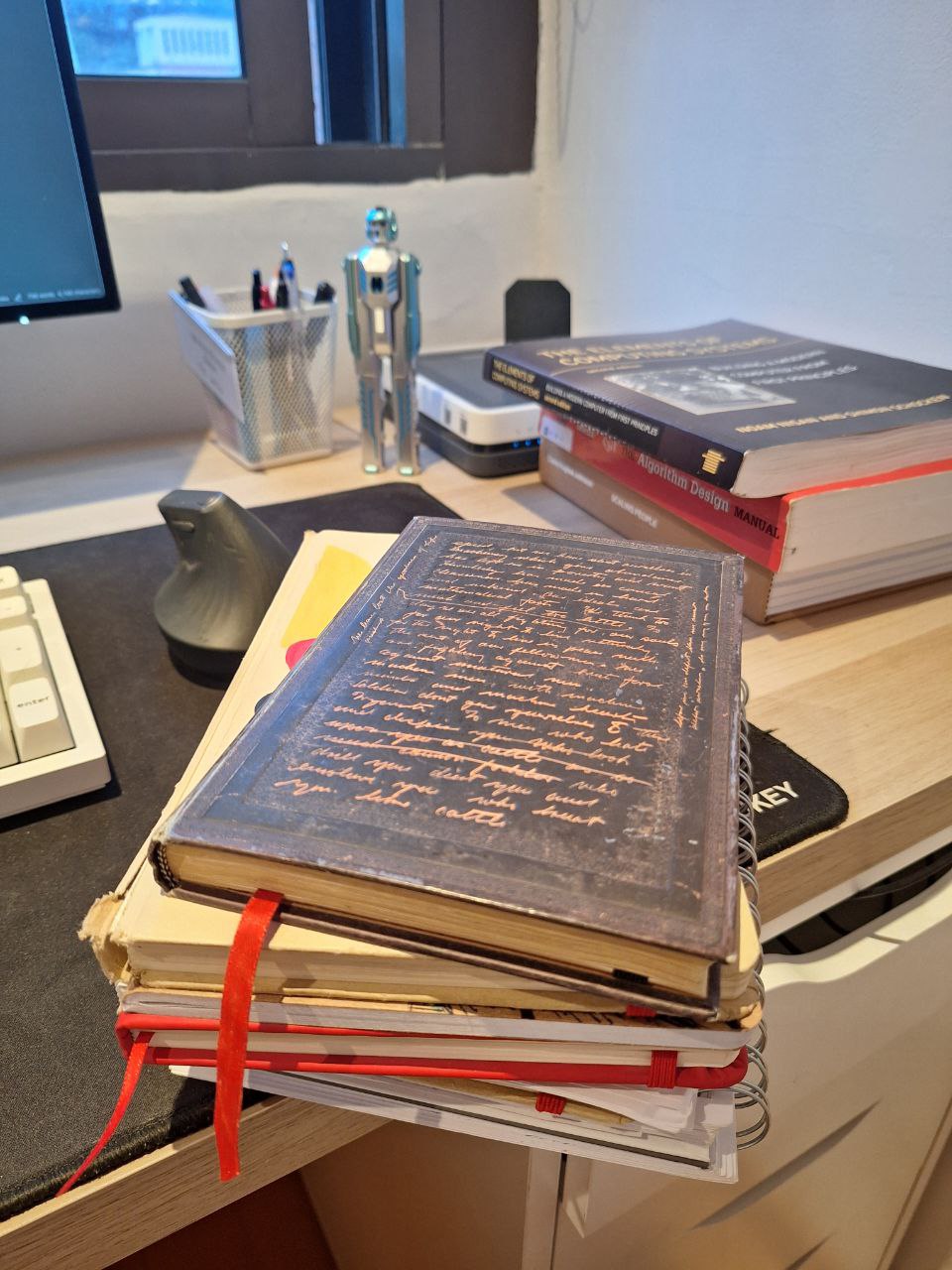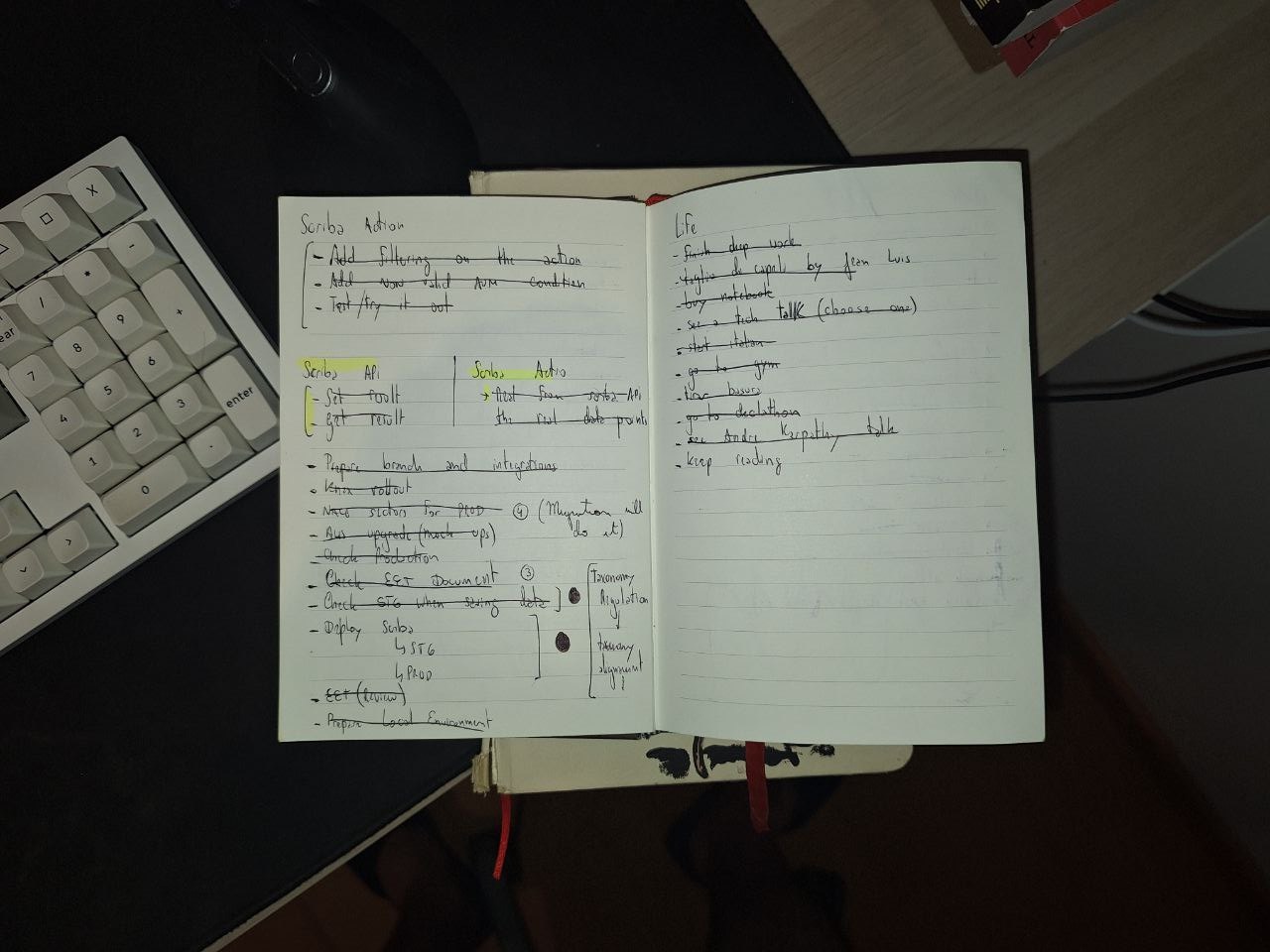How I Take Notes
Oh, well!
Another post about notes and how to take them to be more productive!
That’s right, another one, but in this case, I want to provide a bit of flavor on the notes I take and the things I do while I’m taking them.

Background
I’ve been taking notes since I was a child, on everything.
As a kid, I started using a notebook with a pink elephant cover (a super peculiar book, which is why I still remember it), and from there, I never stopped.
From time to time, I revisit old notes, but primarily, I take notes to understand the present. Not even for tomorrow or yesterday, but for today.
I’m taking notes not to prevent the future or try to coordinate it, but to shift myself today towards a goal.
If I’m not working towards X today, it’s likely that X won’t exist in my notes.
Division
I use a notebook, a classical one, and from there, I take two pages: the left side is for work, and the right side is for my life outside of it.
This may sound silly, I know, but it’s incredibly powerful to go back in time and have a glance at how much I was working or living, depending on the period I’m looking at.
It’s really incredible to go back to when I started as Head of Engineering at Datia; my notes were almost entirely work-related.
Life was mostly gym, going for a walk, and not much else.

Types
The notes I take can vary from specific tasks at work that I need to accomplish during the day to something more vague, such as: research about X.
Of course, remember that I’m taking notes just for the present day, so for this research to remain active, it has to be continuously updated, which curiously drives me to focus more on what’s important and what’s not.
If I jot down a reminder for something that I don’t end up doing, it gets penalized and won’t appear in the next two pages. Mentally speaking, of course, since the system I maintain is meant to be as simple as possible.
Apart from that, the types of tasks related to life, in general, could vary from taking PTO, researching a topic I know nothing about (e.g., how short selling works), or even personal goals such as writing this blog post.
Mechanism
I tend to use almost no mechanism other than opening the notebook to a specific page and adding notes whenever I feel I should track something.
Plot twist: I tend to track almost everything.
Historically speaking, this mechanism has been polished by me on a daily basis and was put under stress during many times in my life, so I can trust that it’s a quite good method to avoid losing information.
While I’m taking the note, I tend to summarize as best as I can what needs to be done without any further information.
Additional Notebook
Since the first notebook is just for simple one-liner notes, the background required in case of research for a task is added to a second notebook (which I use as a normal notebook).
This generally works quite well, except when there’s something I need to scratch my head about, and the paper is quite obtuse (I love white-boarding; however, I don’t have the space for it right now in my current office).
Conclusion
This method is simple, without any friction, and it works in every environment.
It’s also reflective of my past self since I can quickly see how much “burn” I was experiencing during a specific time of the year. To me, the most important thing about this method is that you can be hard on your past self whenever you feel you are working too much because, sincerely, the right side of the notebook will be almost empty.
You can easily take action if needed with this method.
Additionally, I tend to not track dates or specific things unless the situation is meaningful enough (the reason for this is quite personal).
Apart from taking notes, it’s really a peace of mind to have everything in writing instead of having all of that in my mind.
It’s a good thought-shortcut (as I call it) when I need to think about past decisions, what I did at any specific moment of my life, and more.
I tend to not write about the future since it’s impossible to plan for that, and I leave those things to meditation in general.